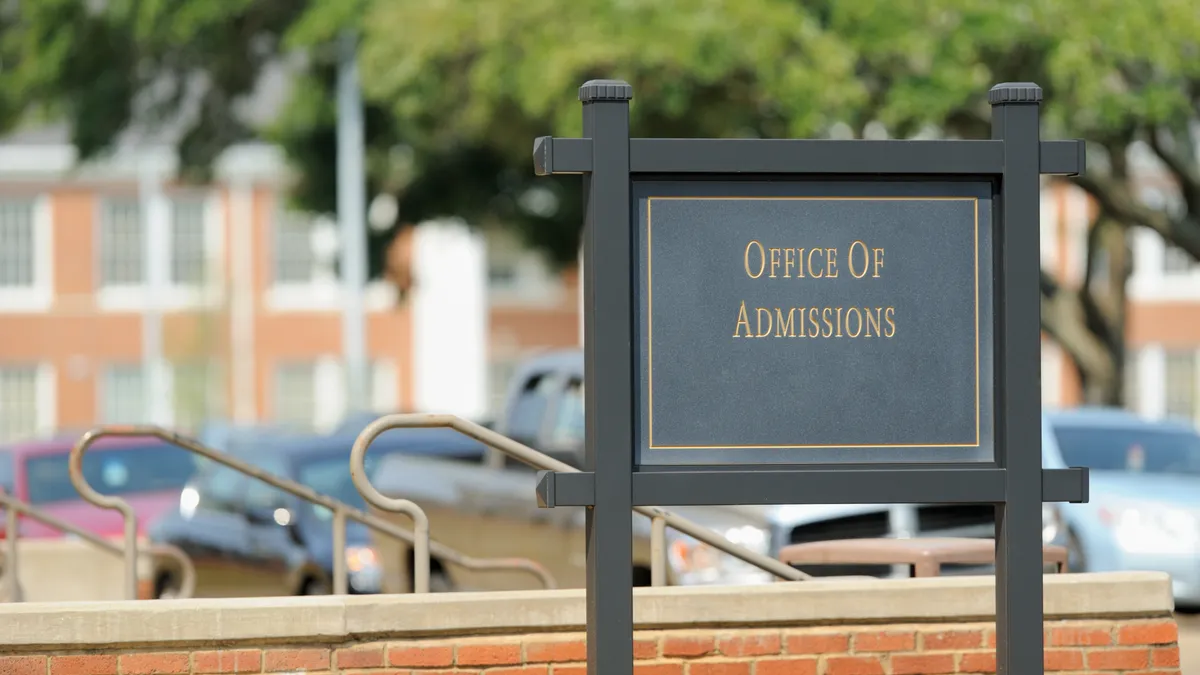College hopefuls preparing to sit for the ACT next year can rest a little bit easier knowing they'll be able to retake parts of the test to improve their score.
But admissions experts caution that the latest change to the college entrance exam risks perpetuating the standardized-test frenzy that higher education institutions are beginning to push back on. And they say it could further disadvantage students who don't have the resources for extensive test prep.
"It's great to be able to retest on a section, but it doesn't mean much if there are barriers to doing that," said Zenia Henderson, director of member and partner engagement at the National College Access Network (NCAN), which works with first-generation and low-income students. "When a student doesn't have the resources to prep heavily ... the impact could be pretty insignificant."
This week, the ACT announced that beginning next September, students who have completed the full test, including through state and district testing, can retake one or more of its five single-subject sections. There are no limits on how often they can retake sections of the test.
The test-maker will also start serving up a so-called "superscore" that counts only students' best attempts on each section. That score is offered by its competitor, The College Board, which puts out the SAT, and is a calculation many schools run for applicants' submitted scores.
Standardized tests are just one factor in a student's college application, and one that a growing number of schools are backing away from. More than 1,000 four-year colleges and universities don't require students to submit standardized test scores with their applications, with more than 30 making the change in the last year alone, according to the National Center for Fair & Open Testing.
Some schools, including Hampshire College, which lets students design their majors, have stopped considering scores altogether.
Concerns over using a single figure to weigh an applicant's merits aren't limited to tests or GPAs. This past summer, The College Board announced it was dropping its "adversity score," a composite measure used to contextualize a student's achievements with a snapshot of their high school's rigor and neighborhood's housing values.
It still offers colleges that information, just as two separate measures, and it is data that institutions have long used in admissions decisions.
"Part of the pushback on the (score) was 'We don't know what this is. How is it going to help or hurt my son or daughter?'” said John Barnhill, assistant vice president for academic affairs at Florida State University, in an interview with Education Dive last month to discuss The College Board's change.
Pros and cons
The Varsity Blues scandal that ripped through higher education earlier this year added fuel to the discussion, highlighting how privilege impacts the advantages that wealthy students and their families have when it comes to getting into college.
That could include connections to donors, more experience with the admissions process and being able to afford better test prep.
Some observers argue that the ability to retake the ACT would allow students with more time and money at their disposal to continue to study and sit for the exam until they are happy with their score. And, further, that those students who can do so will feel compelled to.
"I can't think of a time, place or space where a student taking a test or tests more frequently has created opportunities for them," said Annie Reznik, executive director of the Coalition for College, which provides an alternative to the Common Application for college admissions. "If anything, it only has further widened the gap between under-resourced students and those students who have resources, and added a layer of stress to being able to work toward producing the highest score."
Retakes will be available seven times a year on the same dates as national ACT tests. Students can take up to three section tests on any one test date. Suzana Delanghe, chief commercial officer at ACT, said the organization will give three free vouchers for retakes to students who qualify for free and reduced lunches, in addition to the vouchers they already get for the full test. The ACT hasn't set a cost for retakes.
Delanghe doesn't think the retest policy will disadvantage those students but instead will be an important time-saver. "It's going to provide them with different opportunities to take the test," she said, as retaking part of the test instead of the entire exam could mean less time spent away from work and family responsibilities.
According to ACT, students have the option to retake the full test up to 12 times, but only 45% of students take it more than once. Retaking standardized tests may have some benefits, however. ACT said its own research found that students who retake the test tend to earn slightly better grades in college. And research from The College Board has shown that retaking the SAT may be more helpful for low-income students, though they are less likely to do so.
Elite institutions may be relying less on standardized tests but they do play a significant role in admissions at some larger institutions. "It's important for students to have options for standardized testing if in fact they are applying to a school that requires test scores," said Jayne Caflin Fonash, president of the National Association for College Admission Counseling.
Further, NCAN's Henderson said, the stress on students of a timed, three-plus-hour exam makes the opportunity to retake it in pieces important.
Online testing available
Also included in ACT's announcement is the addition of computer-based testing for students who take the exam at designated test centers on national testing days. College Coalition's Reznik is optimistic that the change represents "the seeds of an online standardized test movement," citing the success of Duolingo's English proficiency exam.
Delanghe said the move is "all about giving flexibility to the students and making sure that they can test in a mode which they feel comfortable with."
Still, the impact of ACT's new changes won't be known until they go into effect next year. "My hope is that the new ACT test opportunities would be used by students after having a conversation with their school counselor about the best path for them," Caflin Fonash said.
Correction: This story has been updated to clarify that students who took the ACT through state and district testing are eligible for section retests.





















